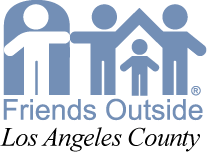
Mary: Tell us about yourself.
Cheryl: I have a master’s in social work from Bryn Mawr College with a specialization in community organizing and social planning. I’ve taught in schools of social work at several institutions, served as the Director of the Office of Community Services, Department of Veteran and Community Services, for the State of Florida, and was the Assistant Director of the Kellogg Training Center at United Way in Los Angeles. I have had a consulting practice since 1986.
Mary: In what capacity did you work with Friends Outside in Los Angeles County?
Cheryl: I served as a consultant from 1999 to 2020. My work included program planning, proposal writing, strategic planning and board development
Mary: How was FOLA funded then?
Cheryl: I met the Executive Director, Mary Weaver, at a City of LA-sponsored workshop where I was a presenter. Mary approached me afterward. I wasn’t aware of Friends Outside but was interested because I had family members who might have benefitted from such a program.
Mary: How did you get involved with FOLA? Why did you get involved?
Cheryl: I think there is greater awareness about the criminal justice system, such as the costs of incarceration and the questionable efficacy of incarceration. Long sentences, Three Strikes, systemic racism, equipping people for release, and rehabilitation are now common topics in public discourse.
Mary: You were a consultant for FOLA for 21 years. How have you see FOLA change?
Cheryl: FOLA has grown significantly, programmatically and fiscally. The field of re-entry has progressed and is requiring more professionalism. And, FOLA has responded by bringing on more staff with college-level education in social work and human services. The employment program has been a huge success, FOLA has expanded its service sites, and now has major federal grants.
Mary: What do you think were your biggest contributions to FOLA?
Cheryl: My greatest contributions were to improve the quality of the proposals by adding information from literature reviews regarding best practices and researching demographic and other data to document the need for FOLA’s services. I also encouraged FOLA to “think bigger” by pursuing larger grants, including federal ones.
Mary: How do you hope FOLA continues to evolve over the next 20 years?
Cheryl: I’d like to see FOLA:
- Expand services to other areas of LA County and reestablish services in Long Beach;
- Provide gender-specific services for reentering women.
- Offer more inter-related services within a geographic area so that there can be a “layering” of services, e.g., integrate the after-school program into the fatherhood program.
- Increase administrative staffing.
- Have a data collection and tracking systems across programs.
- Increase collaboration with mainstream child and family services and child development providers.
Mary: Anything more you would like to add?
Cheryl: The services FOLA provides are very much needed. There is more interest in re-entry services at all levels of government – a recognition that people who are incarcerated do come back to the community. I hope FOLA will continue to be a leader in the re-entry field for many years to come

